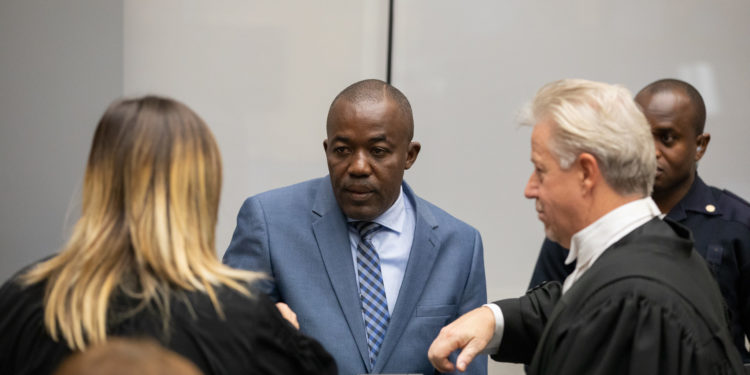By Thomas Verfuss in The Hague
It can be said about any meeting about complex issues that participants and observers must have read the documents that are being talked about, in order to understand the discussions, to make meaningful contributions themselves and to be able to make accurate administrative or journalistic reports about those meetings. This also applies, of course, to proceedings before international criminal courts and tribunals, where the highest political and military leaders are charged and cases often deal with the complexities of the situation of a whole country in conflict, often over a very extended period of time of years.
This is why there has always been a practice since contemporaneous international criminal justice started in 1993 that the prosecution would publish an indictment (or “document containing the charges”, as it is called at the ICC) in writing before the oral proceedings on the merits started.
This would allow journalists and the general public to see not only what the alleged crimes are, but also the correct spelling of the names of the suspects and possible accomplices, and of the names of places of events mentioned. Dates and other figures in writing can help accurate reporting and avoid misunderstandings when following the oral hearings in the courtroom. Having the facts available in a charges sheet, would allow journalists to publish “curtain raisers” just a few days before the beginning of the first oral hearings on the merits of the case, to prepare the public and facilitate the understanding of and informed debate about the days in court to come.
The International Criminal Court broke with this tradition on September 19th, 2019. On that day, the confirmation of charges hearings began in the case of Alfred Yekatom and Patrice-Edouard Ngaïssona, the first suspects from the Central African Republic in the ICC’s custody. The two had been arrested in 2018.
The “document containing the charges” was available on September 19th for judges, defence, and, of course, the prosecution that had produced it. But as the document contains not only (as its name indicates) the charges, but also information that must remain confidential according to the Office of the Prosecutor (OTP), for example because victims and witnesses could be endangered, the full version of the document could not be published. It is, however, established good practice in international courts that a so-called “public redacted version” of the charges sheet is produced in a timely manner.
The OTP did no such thing in the Yekatom/Ngaissona case, in spite of repeated requests from Journalists For Justice (JFJ) to both the OTP media newsdesk and the presiding judge of the Pre-Trial Chamber. The OTP sent the public redacted version to the Registry for distribution only on the evening before the confirmation of charges hearings started.
Journalists could not write informed curtain raisers with up to date information. Alleged crimes were, of course, mentioned in the (public versions of the) arrest warrants. But those warrants were drafted in 2018. In spite of statements to the contrary (requests for arrest warrants only when sure to have all the evidence for conviction), the OTP has been seen doing investigations after the arrests. So journalists could not be sure that the arrest warrants information was still up to date.
The court stenographers and interpreters did not have the benefit of a written document to know how to write and pronounce the names. An imam from the Central African Republic who attended the hearings on the public gallery complained that he did not understand certain names – about his own country. That probably was because the French interpreters he was listening you just had to try and reproduce phonetically as best as they could what they thought they understood of the names mentioned by English speakers of the OTP in the courtroom.
Why was the public redacted version of the document containing the charges not made available in a timely manner? One ICC judge told Journalists For Justice that he had heard that it had been “forgotten” (in spite the repeated requests to both the OTP media people and the pre-trial chamber). Another inside source told JFJ that the members of prosecution team, in the days before the hearings, are focused on preparing good presentations in the courtroom and “tend not to think about the journalists”.
In order to discipline the OTP into doing what is due to facilitate accurate and informed reporting about the proceedings, the Assembly of States Parties (ASP) can act immediately. The ASP, as the legislative body of the Rome Statute system, can amend the Rules of Procedure and Evidence.
Rule 121 RPE now reads:
“Rule 121
Proceedings before the confirmation hearing
[…]
3. The Prosecutor shall provide to the Pre-Trial Chamber and the person [suspect], no later than 30 days before the date of the confirmation hearing, a detailed description of the charges together with a list of the evidence which he or she intends to present at the hearing.
[…]”
This disposition makes sure that the defence has adequate preparation time before the start of the hearing. But what about the journalists? The filing under rule 121(3) may be confidential, as it was in the Yekatom/Ngaïssona case.
The diplomats at the ASP can easily improve the system by amending rule 121 as follows:
“Rule 121
[…]
3. (a) The Prosecutor shall provide to the Pre-Trial Chamber and the person, no later than 30 days before the date of the confirmation hearing, a detailed description of the charges together with a list of the evidence which he or she intends to present at the hearing.
(b) In the event that the document under (a) can not be filed publicly for reasons of witness protection or other important considerations prevailing over the principle of publicity of the proceedings, the Prosecutor shall provide a public redacted version of the description of the charges under (a) no later than 14 days before the date of the confirmation hearing.
[…]”
Further reading:https://www.icc-cpi.int/resource-library/Documents/RulesProcedureEvidenceEng.pdf







